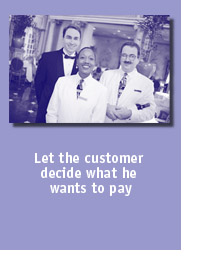
Pay As You Like
| Ïðîäàæè | ||||
| Sales.com | ||||
| Negotiat... | ||||
by Graham Denton
Just Around the Corner is a fancy London restaurant with a novel, if not unique, pricing philosophy. Following the belief that if he gives his customers good food and good service, they will pay accordingly, owner Vasos Michael has dropped all prices from the menu. "You pay as you like," he explained to Forbes writer Tomas Kellner in a September 1999 story on his establishment.
 His
daring philosophy seems to be working just fine. Just Around the Corner
is constantly booked, they did $1.2 million worth of business last year,
and according to the owner, customers pay on average about 10 percent
more than he had originally anticipated. A party of four recently ordered
a two–course dinner which they figured was worth $600.
His
daring philosophy seems to be working just fine. Just Around the Corner
is constantly booked, they did $1.2 million worth of business last year,
and according to the owner, customers pay on average about 10 percent
more than he had originally anticipated. A party of four recently ordered
a two–course dinner which they figured was worth $600.
The sales relevance of this success story may not be immediately apparent, and no, I'm not suggesting that you enter your next negotiation ready to accept your customer's demand that you give it to him for cost. But the story does teach us something about selling—and particularly about the principle of overdelivering on which sales success depends. Just Around the Corner turns a profit not because of, or in spite of, its unusual price structure, but because it lives up to its implicit promise of a great dining experience. Michael's staff evidently makes that experience so memorable that most customers are willing to "overpay" in order to secure it.
The same thing can be said of every truly successful sales endeavor. Selling works best when you exceed your customer's expectations. When that happens, price rarely becomes a negotiating hurdle. It may of course be an issue in an initial negotiation. But after you've once delivered more than you've promised, it seldom remains one. That's why "letting the customer set the price" is less crazy than it seems. It's really only a quirky spin on "letting the market decide." That's what business is about, when you come right down to it. Michael has only made it blatant—and trusted his instincts.
I know what you're thinking. "What about the customer who takes advantage of his no–sticker gambit? Isn't Michael in danger of losing his shirt to the wily underpayer?"
Actually, no. When customers pays a patently "silly" amount, Michael simply—and publicly—refunds their money. That embarrasses them, of course, and it keeps them out of the restaurant in the future. But there's also a broader sales logic to this second daring gambit, which relates to a common negotiating issue, the question of discounting.
When you return a customer's money because it's ludicrously inadequate, you're saying in effect, "We believe our product is worth a premium price. If you're this dissatisfied with us, we'd prefer you didn't pay us at all, because there's obviously a gap between what you require and what we can deliver. This one's on us, because we're not in the business of giving so–so service for a so–so fee." The relevance to the discounting game should be apparent. Giving bulk or introductory discounts is one thing. Cutting your prices to beg for revenue is quite another. You cannot build good business by letting the stingy decide.
That's a principle that Vasos Michael evidently understands.